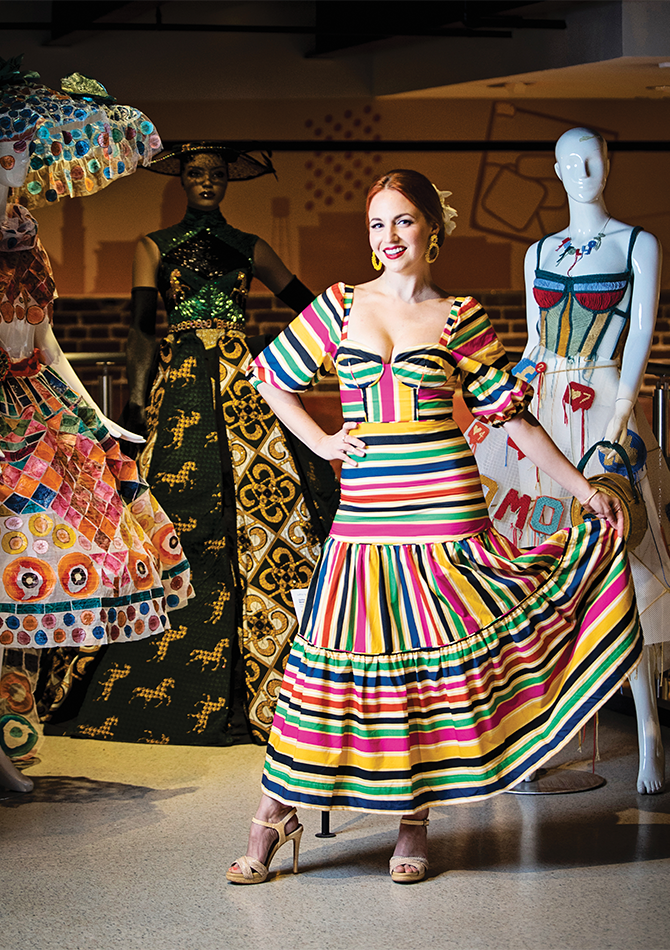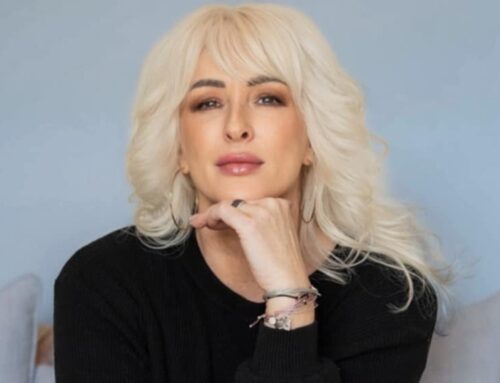
Catherine’s Farm Rio two-piece dress, her own.
Catherine Jones: Owner & Founder, Bonhomía
Written by Dawn Anderson, Rocko Jerome and Taylor Riley | Photographed on location at the Frazier History Museum by Kylene White | Styled by Christine Fellingham and Melissa Gagliardi | Hair and makeup by Sarah Allen, Kassandra Cazares Aldana, Kayla Greenwell, Breanna Peters and Michaela Reeves
The field narrowed from over 400 nominations to 89 nominees and finally to the 16 award winners you will meet on the following pages. Representing each of their categories with distinction, your 2023 Most Admired Women bring humility, grace and a great capacity for change to their roles as leaders in our community. We asked each of them to reflect on how they got to this moment, what your votes and this award means to them and where their journeys might take them from here.
—
“This is less about me and more a reflection of the women with whom I work,” says Bohhomia Owner & Founder Catherine Jones of her win in the Arts category. Bonhomía is a fair trade fashion collaborative that Catherine developed as part of her personal response to the global pandemic (www.bonhomiadesigns.com) and it produces leather and textile goods that are inspired and created by Guatemalan artisans in indigenous Mayan communities.
During 2020, Catherine set aside some other entrepreneurial interests to pursue this passion project: “I decided to focus on what fulfilled me the most: the textile arts and the Guatemalan style of ‘backstrap’ weaving,” she says. “I am deeply touched that others see my passion and feel inspired by it! My goal is to bring positive economic impact to independent artists within rural Guatemalan and indigenous communities where the need is so great.”
About a year ago, Catherine contracted Covid and subsequently was diagnosed with a form of dysautonomia known as “POTS” — Postural Orthostatic Tachycardia Syndrome. The chronic neuropathic condition reduces her energy levels and disrupts the circulation of blood to the brain. “I started getting back to work slowly in the months following my diagnosis, but I’m fighting for my goals even harder and pushing through,” she says. “Bonhomía’s growth helps ensure the continuation of these sacred arts. Knowing that our success directly fuels the entrepreneurial spirits of many women in these hard-to-reach areas is especially gratifying.”
“Everyone calls it something different, intuition or divine power. I simply knew I wanted to build a platform that could shine a light on these beautiful art forms and provide more opportunity.”
Catherine feels a cultural responsibility to educate the customer about the art, product, and women behind the designs, and so finds it challenging to hire the right people. “It is difficult to find someone who shares the same depth of passion,” she says. “We are a small but mighty team. A tight-knit group keeps the business running in Kentucky while I’m in Guatemala.” Stateside, Catherine is grateful to her former spouse Andrew Kung and the mutual support and wisdom in building their businesses through the years. While in Guatemala, Catherine connected with Andrew Solorzano, who has been “an incredible source of strength and encouragement, as well as an interpreter– ‘my life partner who helps keep the ball rolling in Guatemala.’”
Unlike many successful business owners, Catherine has never really established a grand business plan. “I started in blind faith with an intense calling,” she says. “I can only see the next step and take each as it’s shown to me. Everyone calls it something different, intuition or divine power. I simply knew I wanted to build a platform that could shine a light on these beautiful art forms and provide more opportunity.” With sustainability as a growing concern, Bonhomía allows its artists to work from home with the majority of fabrics being ethically sourced from repurposed handwoven garments. Says Catherine, “I design my leather goods as a picture frame for these textile arts.”
Unconcerned with sudden viral success or major brand-building, Catherine intends for Bonhomía to stay relatively small. “Moderate growth allows us to maintain personal connections,” she says. “We simply want to reach a level of consistency and success to provide steady work for a larger sum of (Guatemalan) communities. Eventually, we hope to help provide business education to the women within these areas who are seeking it. Equipping them to lead weaving cooperatives for other single women and mothers will have an enormous impact for the future.”
For Catherine, success is reflected in joyfulness. “Whenever I see the ladies happy, and when our leather artisans are proud of their work, that is the goal,” she says. “Whether shopping by appointment or online, seeing customers connect with our story and the pieces, carrying them with joy, and sharing them with friends is success to me. If you feel exhausted and happy at the end of each day, you know you’re headed in the right direction. Success is being able to take care of yourself and improve the lives of others.” — Dawn Anderson




